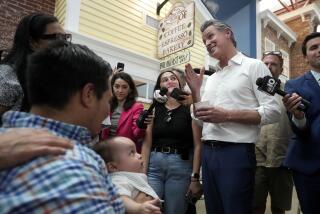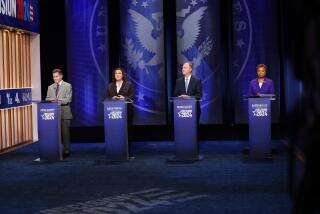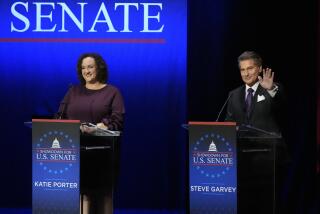Dole, Gramm Spar on Ideas, Electability : Politics: Texas senator challenges the majority leader’s conservatism in the first campaign exchange in New Hampshire. In all, nine Republicans begin testing the waters one year before primary.
- Share via
MANCHESTER, N.H. — A year and a day before the votes are cast in the nation’s first presidential primary, the Republican Party’s two top contenders opened a potentially divisive argument over a fundamental choice between pure conservatism versus electability.
Sen. Phil Gramm of Texas struck the first blow--challenging the conservative credentials of Senate Majority Leader Bob Dole of Kansas, who is the front-runner in early polls. Based on his organization and fund-raising prowess so far, Gramm appears to be Dole’s chief rival.
“I believe I am more conservative than Bob Dole, I believe I am more committed to fundamentally changing American government than Bob Dole,” Gramm claimed.
Dole, who has been trying to avoid the acrimonious exchanges that have damaged his presidential hopes in the past, at first did not respond to Gramm’s jibe, which the Texas senator initially made on Friday in an interview with the Boston Herald and then repeated in an ABC-TV interview broadcast Sunday morning.
Finally, on Sunday, Dole struck back in a speech to a crowd of nearly 300 gathered to hear him in Dover, N.H., about 30 miles east of here.
“It doesn’t do much good to win the nomination unless you can win the election,” Dole said. New Hampshire Republicans have the chance “to decide for a lot of people who our nominee is going to be” when they vote in the initial primary, he said. “We need to pick our best candidate.”
Gramm’s depiction of Dole as “a status quo person” seemed to reflect advice from some of the Texan’s strategists that he must sharpen the contrast between himself and the Senate GOP leader in order to overcome Dole’s early lead.
For his part, Dole said in his Dover speech that he was best suited for the presidency because he understands that leadership sometimes requires compromise.
“I’m not a Lone Ranger. I know what leadership is about,” he said. “It’s about getting people following you.”
While Dole and Gramm took each other’s measure, seven other GOP presidential possibilities--including Rep. Robert K. Dornan of Orange County--trooped around New Hampshire’s snow, drawn by the chance to test themselves against their competitors at a forum organized by Manchester’s WMUR-TV and at a sold-out state party fund-raising dinner.
Sparking the enthusiasm of the GOP candidates--along with optimism about their party’s ability to recapture the White House--is the widespread belief that, despite the polls showing Dole ahead, no single candidate yet dominates the race.
Dole’s rivals, recalling the Kansan’s two previous primary defeats here in 1980 and 1988, see him as far from invincible.
“It’s wide open,” said conservative commentator Patrick J. Buchanan, who plans to announce his candidacy next month.
“I don’t remember the pace ever being this intense this early,” said Gerald Carmen, who helped engineer Ronald Reagan’s come-from-behind victory here in 1980.
One sign of the hothouse tempo of the campaign: When Gramm proudly announced that New Hampshire’s senior senator, Robert C. Smith, would chair his campaign in the state, the local leader of former Tennessee Gov. Lamar Alexander’s campaign sneered at the news, calling it a “desperation move.”
Tom Rath claimed that Gramm was forced to make the announcement to compensate for his alleged failure to match the organizational strides of Alexander, who is viewed as holding the No. 3 niche in the early going.
*
In this small-scale competition, in which the outcome will be decided by approximately 150,000 voters--a fraction of the electorate in some other states--little things mean a lot, or seem to at the time. Thus Alexander’s forces are still gloating over the fact that at a fund-raising dinner last week in Carroll County, their supporters showed up bearing signs boosting their candidate, while Gramm’s backers had none.
Time also is measured in a different way here.
Despite the 12 months remaining before the primary vote, Charles M. Arlinghaus, executive director of the state GOP, declared Sunday that “anybody who isn’t already in, is late,” as he gleefully toted up the proceeds from the 1,400 tickets sold at the $100-a-plate chicken dinner.
Yet this view may not be sufficient to discourage everyone. Charles Black, senior adviser to the Gramm campaign, said that based on his soundings of prominent Republican officeholders, he is “convinced” that California Gov. Pete Wilson intends to enter the race.
*
Such a move, given Wilson’s base in the nation’s most populous state and his presumed ability to raise funds, would force all the other candidates to reassess their own positions, particularly Alexander, who has been striving to capitalize on the fact that he is the only contender with experience in a governor’s mansion.
Meanwhile, determined not to surrender his initial advantage--and to overcome his past lack of rapport with New Hampshire voters--Dole hustled around the state like an eager underdog. His itinerary included more than a dozen appearances over the three-day President’s Day weekend.
This regimen left no time for him to appear at the WMUR forum. “When you have a schedule you have to keep to it,” said former New Hampshire Sen. Warren B. Rudman, a key Dole ally in the contest.
But given the inevitable cluttered and blurry impression created by having eight candidates crammed into a one-hour discussion, Dole may not have lost anything by his absence, observers said.
“If this was a triumph for anyone, it was for Dole,” said Robert Heckman, Gramm’s Northeast regional coordinator, after the session had concluded.
*
Still, the forum was useful for the lesser-known candidates, most of whom are still considering whether to make the run for the White House. They used it and their brief remarks at the dinner to help establish their political identities.
On hand to meet voters here, besides Dole, Gramm, Alexander and Buchanan, were Indiana Sen. Richard G. Lugar, who stressed his experience in foreign policy; Pennsylvania Sen. Arlen Specter, who emphasized his support for abortion rights; Dornan of Garden Grove, who defended his charge that President Clinton had given “aid and comfort” to North Vietnam by his opposition to the war; former Labor Secretary Lynn Martin, who would be the only woman in the race if she should decide to run, and Alan Keyes, former ambassador to the U.N. Economic and Social Council and a one-time GOP candidate for the Senate in Maryland. He would be the first African American to compete for the Republican nomination if he enters the race.
Times staff writer David Lauter contributed to this story.
More to Read
Get the L.A. Times Politics newsletter
Deeply reported insights into legislation, politics and policy from Sacramento, Washington and beyond. In your inbox twice per week.
You may occasionally receive promotional content from the Los Angeles Times.










